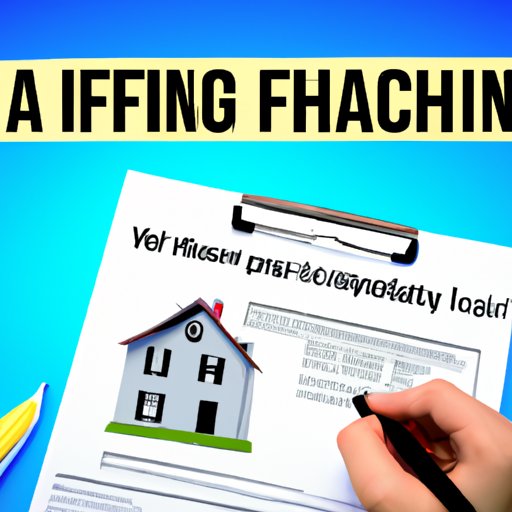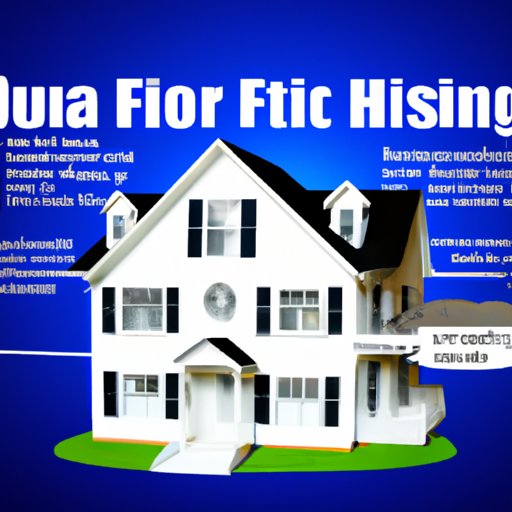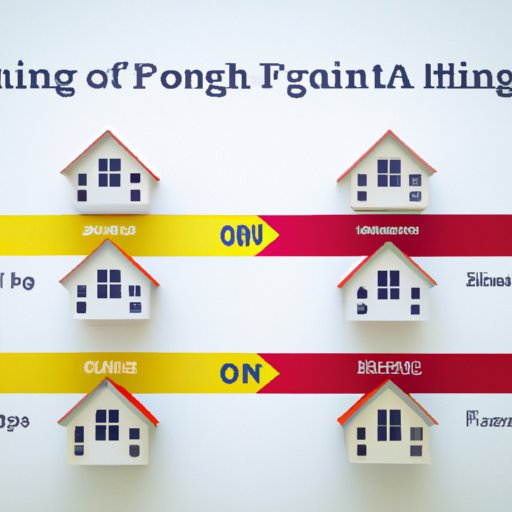Introduction
FHA financing is a type of mortgage loan offered by the Federal Housing Administration (FHA). This type of loan offers many benefits to borrowers, including low down payment requirements, flexible credit requirements, and lower interest rates. It’s an attractive option for first-time homebuyers and those with limited funds for a down payment. In this article, we’ll explain what FHA financing is and how it can help you buy a home.

Explaining FHA Financing: What You Need to Know
The FHA was created in 1934 as part of the National Housing Act. Its mission is to provide safe and affordable housing options for all Americans. To do this, the FHA insures mortgages made by private lenders, protecting them from losses if the borrower defaults on their loan.
To be eligible for an FHA loan, borrowers must meet certain criteria, including having a valid Social Security number, being legally allowed to work in the U.S., and having a steady income. Borrowers must also have a good credit history and be able to demonstrate the ability to make timely payments.
The FHA offers several types of loans, including fixed-rate mortgages, adjustable-rate mortgages, and reverse mortgages. The type of loan you qualify for will depend on your credit score, income, and other factors. Generally, the minimum credit score required for an FHA loan is 580 or higher. Borrowers with a credit score below 580 may still be eligible for an FHA loan, but they’ll need to have a down payment of at least 10%.
In addition to the down payment requirement, borrowers will also need to pay closing costs, which typically range from 2% to 5% of the loan amount. These costs include appraisal fees, title insurance, and other miscellaneous expenses.
A Comprehensive Guide to Understanding FHA Financing
If you’re considering applying for an FHA loan, it’s important to understand the process and what you’ll need to do to get approved. Here’s a step-by-step guide to help you understand the process:
How to Apply for an FHA Loan
The first step in applying for an FHA loan is to contact a lender and get pre-approved. You’ll need to provide your financial information, including your income, credit score, and other documents. The lender will then determine if you’re eligible for an FHA loan and provide you with a pre-approval letter.
The Process of Getting Approved for an FHA Loan
Once you’ve received a pre-approval letter, you can start looking for a home. When you find one you’d like to purchase, you’ll need to submit a loan application to the lender. The lender will review your application and order a property appraisal to determine the value of the home. If the appraisal meets the lender’s standards, the loan will be approved.
Understanding the Terms of an FHA Loan
When you receive approval for an FHA loan, you’ll need to understand the terms and conditions of the loan. Some of these terms include the loan amount, interest rate, loan term, and monthly payments. You’ll also need to understand any additional costs associated with the loan, such as closing costs.
Common Mistakes to Avoid when Applying for an FHA Loan
Applying for an FHA loan can be complicated, so it’s important to avoid common mistakes that could delay or derail the process. Some of the most common mistakes include not having a large enough down payment, not understanding the terms of the loan, not providing accurate financial information, and not shopping around for the best deal.

How FHA Financing Can Help You Buy a Home
FHA financing can be a great option for those looking to buy a home. It offers a number of benefits, including:
Low Down Payments
One of the biggest advantages of FHA financing is the low down payment requirement. Most FHA loans require just 3.5% of the purchase price as a down payment. This makes it easier for first-time homebuyers and those with limited funds to purchase a home.
Flexible Credit Requirements
The FHA also has more lenient credit requirements than other loan programs. While conventional loans generally require a credit score of 620 or higher, FHA loans allow borrowers with a credit score of 580 or higher to qualify. This makes it easier for those with lower credit scores to purchase a home.
Lower Interest Rates
Another benefit of FHA financing is the lower interest rates. FHA loans are insured by the government, so lenders are able to offer lower interest rates than they would for conventional loans. This can save you thousands of dollars over the life of the loan.
Home Improvement Loans
FHA loans also offer home improvement loans, which allow borrowers to finance renovations and repairs to their home. These loans can be used to make upgrades to a home before moving in or after purchasing it.
Benefits of FHA Financing for First-Time Homebuyers
First-time homebuyers can benefit greatly from FHA financing. Here are some of the most notable benefits:
Low Down Payment
As mentioned above, FHA loans require a down payment of just 3.5%, making it easier for first-time homebuyers to purchase a home. This is much lower than the 20% down payment typically required for conventional loans.
Flexible Credit Requirements
FHA loans also have more flexible credit requirements, making it easier for those with lower credit scores to qualify for a loan. This can be especially beneficial for first-time homebuyers who may not have established a long credit history.
Lower Interest Rates
FHA loans come with lower interest rates than conventional loans, saving borrowers money over the life of the loan. This can make it easier for first-time homebuyers to afford their monthly payments.
Home Improvement Loans
FHA loans also offer home improvement loans, which can be used to make upgrades to a home before or after purchasing it. This can be especially helpful for first-time homebuyers who may need to make repairs or improvements to their new home.

Comparing FHA Financing to Other Mortgage Options
When comparing FHA financing to other mortgage options, there are several key differences to consider. Here’s a brief overview of some of the most popular loan programs:
Conventional Loans
Conventional loans are not insured by the government and typically require a higher credit score and a larger down payment than FHA loans. They also tend to have higher interest rates.
VA Loans
VA loans are offered to veterans and active military members and are backed by the Department of Veterans Affairs. These loans typically require no down payment and have lower interest rates than conventional loans.
USDA Loans
USDA loans are offered to those living in rural areas and are backed by the U.S. Department of Agriculture. These loans often require no down payment and have low interest rates.
An Overview of the Steps Involved with FHA Financing
Here’s an overview of the steps involved with FHA financing:
Pre-Approval
The first step in the process is to get pre-approved for an FHA loan. You’ll need to provide your financial information to the lender and they will determine if you qualify.
Finding a Home
Once you’ve been pre-approved, you can start looking for a home. Be sure to keep your budget in mind and make sure the home you choose is within your price range.
Applying for a Mortgage
Once you’ve found a home, you’ll need to apply for an FHA loan. You’ll need to provide financial information and documents such as pay stubs and bank statements.
Negotiating and Appraising
After you’ve applied for the loan, the lender will order an appraisal of the property to determine its value. If the appraisal meets the lender’s standards, the loan will be approved.
Closing
The final step in the process is closing. At this point, you’ll need to sign all of the paperwork and pay any closing costs associated with the loan. Once everything is complete, you’ll officially be a homeowner.
Conclusion
FHA financing can be a great option for those looking to purchase a home. It offers a number of benefits, including low down payment requirements, flexible credit requirements, and lower interest rates. It’s an attractive option for first-time homebuyers and those with limited funds for a down payment. With the right preparation, FHA financing can help make your dream of homeownership a reality.
(Note: Is this article not meeting your expectations? Do you have knowledge or insights to share? Unlock new opportunities and expand your reach by joining our authors team. Click Registration to join us and share your expertise with our readers.)
